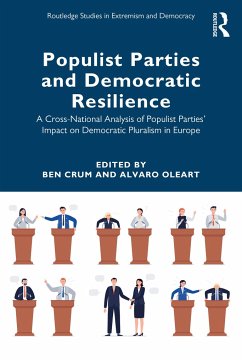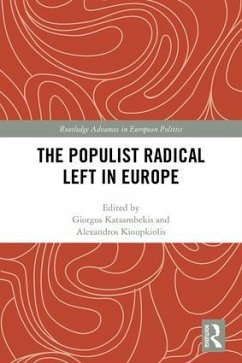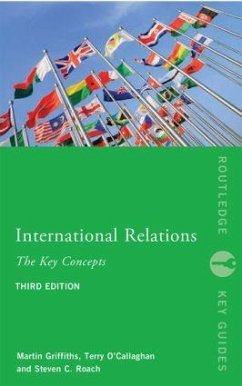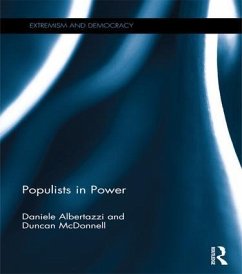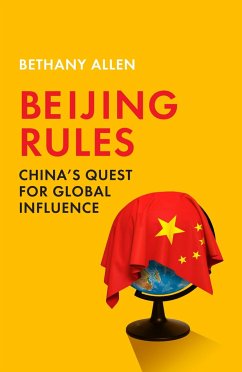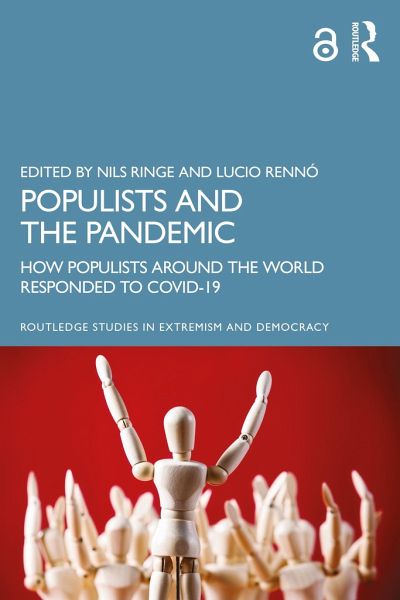
Populists and the Pandemic
How Populists Around the World Responded to COVID-19
Herausgegeben: Ringe, Nils; Rennó, Lucio
Versandkostenfrei!
Versandfertig in 6-10 Tagen
38,99 €
inkl. MwSt.
Weitere Ausgaben:

PAYBACK Punkte
19 °P sammeln!
Populists and the Pandemic examines the responses of populist political actors and parties in 22 countries around the globe to the COVID-19 pandemic, in terms of their attitudes, rhetoric, mobilization repertoires, and policy proposals.The responses of some populist leaders have received much public attention, as they denied the severity of the public health crisis, denigrated experts and data, looked for scapegoats, encouraged protests, questioned the legitimacy of liberal institutions, spread false information, and fueled conspiracies. But how widespread are those particular reactions? How m...
Populists and the Pandemic examines the responses of populist political actors and parties in 22 countries around the globe to the COVID-19 pandemic, in terms of their attitudes, rhetoric, mobilization repertoires, and policy proposals.
The responses of some populist leaders have received much public attention, as they denied the severity of the public health crisis, denigrated experts and data, looked for scapegoats, encouraged protests, questioned the legitimacy of liberal institutions, spread false information, and fueled conspiracies. But how widespread are those particular reactions? How much variation is there? What explains the variation that does exist? This volume considers these questions through critical analysis of countries in the Americas, Europe, Asia, and Africa, by leading experts with deep knowledge of their respective cases. Some chapters focus on populist parties, others on charismatic populist leaders. Some countries examined are democracies, others autocracies. Some populists are left wing, others right wing. Some populists are in government, others in opposition. This variation allows for a panoramic consideration of factors that systematically influence or mediate populist responses to the pandemic. The book thus makes a unique contribution to our understanding of the intersection between two of the most pressing social and political challenges of our time.
The book will be of interest to all those researching populism, extremism, and political parties and those more broadly interested in political science, public policy, sociology, communications, and economics.
The Open Access version of this book, available at www.taylorfrancis.com, has been made available under a Creative Commons Attribution-Non Commercial-No Derivatives 4.0 license. Thanks to the support of libraries working with Knowledge Unlatched www.knowledgeunlatched.org
The responses of some populist leaders have received much public attention, as they denied the severity of the public health crisis, denigrated experts and data, looked for scapegoats, encouraged protests, questioned the legitimacy of liberal institutions, spread false information, and fueled conspiracies. But how widespread are those particular reactions? How much variation is there? What explains the variation that does exist? This volume considers these questions through critical analysis of countries in the Americas, Europe, Asia, and Africa, by leading experts with deep knowledge of their respective cases. Some chapters focus on populist parties, others on charismatic populist leaders. Some countries examined are democracies, others autocracies. Some populists are left wing, others right wing. Some populists are in government, others in opposition. This variation allows for a panoramic consideration of factors that systematically influence or mediate populist responses to the pandemic. The book thus makes a unique contribution to our understanding of the intersection between two of the most pressing social and political challenges of our time.
The book will be of interest to all those researching populism, extremism, and political parties and those more broadly interested in political science, public policy, sociology, communications, and economics.
The Open Access version of this book, available at www.taylorfrancis.com, has been made available under a Creative Commons Attribution-Non Commercial-No Derivatives 4.0 license. Thanks to the support of libraries working with Knowledge Unlatched www.knowledgeunlatched.org





